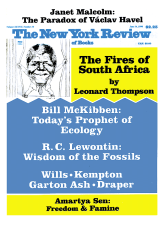Former President Richard Nixon’s newest book is his seventh in twelve years, and any author who trots his muse through paces that incessant cannot fairly demand that her flows of inspiration run as full and fresh as they used. But then who among us has not noticed that, when pride or the tax collector compels the old to go on writing, they tend more and more to repeat what they have written already?
Perhaps they have forgotten what they said or perhaps they are at a dead end for anything new to say. In any case, the erosion of resistance to repeating oneself is a general disability of age, and it commences to encumber President Nixon as it does myself.
In the Arena escorts us through terrain too well known of old. We have been down these sinuous trails before, and the forest has not altered by an unfamiliar leaf nor has our guide’s commentary by so much as a new adjective.
Our once and eternal president does offer a few recollections of meetings with Mikhail Gorbachev and the Chinese mandarin collective; but they would stimulate us more if he were less inclined, as aging authors are, to let a still-genuine shrewdness be distracted by habits of self-referral.
Mr. Nixon cherishes China because he discovered her; he is less susceptible to the Soviets because so many of his predecessor presidents had discovered and lost and found them again before he got his chance. Thus he notices vices in Gorbachev and virtues in Deng Xiaoping that each has been markedly successful in hiding from everyone else. New act, new characters, but the old unchangeable prejudices.
There is, however, one sentence not until now found in or anyway remembered from the canon: “In her whole life I never heard her [his mother] say to me or anyone else ‘I love you.’ ”
He seems to find this restraint admirable; but few of us would carry undeflectedly affectionate memories of a childhood in any such refrigerator, and I doubt if he does either. He certainly did his utmost to shield his daughters from such appalling disciplines.
The other night I happened into Die Walküre, that chapter in the chronicles of another sloppily run and badly ending administration. Wotan’s passages with Brünnhilde inescapably evoked the tableaux of Julie Eisenhower and her father that are among the few coherent explanations for my own heart’s persistent fondness for him.
This talent for the domestic virtues makes all the more lamentable his compulsion to assure himself and us that only the global ones count. History and his place there have become his obsession; he writes and speaks of his life as though we might think it petty if we did not mistake it for epic.
The pity is that he does not recognize that the great man, if such there be, is hardly ever the grand personage. A while ago, the Carnegie Endowment had a luncheon for Elliot Richardson, former secretary of defense and attorney general of the United States. Richardson once had elective ambitions and wrote the book held requisite for serving them. But he now prefers works all the more useful for being less pretentious. At this juncture, he is serving as President George Bush’s personal representative in the multi-national aid program for the de-Marcosized Philippines.
There are few tasks more obscure or less exhilarating than helping Cory Aquino run across the ice, and, yet, there Elliot Richardson stood talking with a schoolboy’s enthusiasm about bringing refrigeration processes to the tuna fisheries.
President Nixon is never more to be pitied than when he obediently cites Winston Churchill’s reminder to Tito that it is power that keeps men young. Power doesn’t. Local, parochial, and domestic attentions do. There is more true if unnoticed glory in storage facilities for fishermen than at the average summit. Elliot Richardson has found his happiness in small and local deeds, and Richard Nixon wanders lost in the cosmic.
This Issue
June 14, 1990



